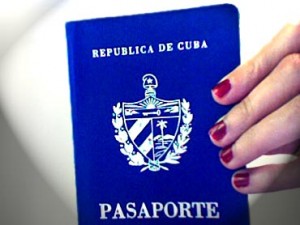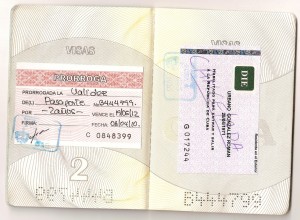
CUBA LIBRE
I am Yoani Sánchez
Survivor of an utopia, I aspire for these texts and opinions to contribute to reach a more plural Cuba, inclusive and based on the words, not the guns, the citizens and not olive green military uniforms.
A PASSPORT, A SAFE PASSAGE
He’s only thirty-two pages, a blue cover and shield of the republic engraved on the cover. The Cuban passport looks more like a pass to an identification with it can skip the island but his tenure does not guarantee that we manage to catch a plane. We live in the only country in the world to acquire the travel document must be paid in a currency different from that received in wages. The cost of “fifty-five pesos convertibles” means the average worker to save the full salary for three months in order to get that little book of filigree and numbered pages. What should be a credential that was obtained by the mere fact of being born in a given nation, this is a privilege for those with hard currency, these notes of colors that are achieved doing just the opposite of what promotes the official .
However, in this first century, is no longer unusual to find a Cuban passport, something extremely rare in the seventies and eighties. At that time only a select few could show a credential that would allow them to board a flight and arrive with her at a foreign airport. We became a people and the few who still managed to get going on official or definitive way to exile. Cross the sea became an award for those who had climbed into the structures of power, the great mass of “unreliable” could not even dream of leaving the archipelago. Fortunately that began to change with the arrival of the nineties. Perhaps it was the massive arrival of tourists who instilled curiosity about the outside or the fall of the socialist government that put the face of evidence that she can not give them “travel stimulus” to the most loyal. The truth is that in those years began unlocked the mechanism to get off the Island
Increasing access to convertible currency, either through the remittance, the self-employment or illegal work-also helped that we could begin to explore other horizons. Most often this is achieved thanks to the solidarity of a friend or relative lives in another country, which covers the excessive costs of a trip. If it were only in our pockets, few would achieve board a flight to anywhere.
It is true that the act of traveling longer a prerogative that benefit only the elect, but the government maintained an ideological filter to prevent from accessing critical gift so delicious. Up to this day remain strong restrictions on entering or leaving the country. For those of us inside, the bolt is called “exit permit” and gives recitals given political. Those who have emigrated, must also undergo a similar process that culminates in the acceptance or not to enter as tourists to their homeland. The final decision to have it both permits a military institution that claims the right not to explain. Hence, in the offices where the call is requested “white card” or consulates where our exiles must seek the approval of access, the human dramas happen, the arbitrariness are the order of the day. Those that emit critical opinions, belonging to an opposition group or have dared to exercise independent journalism rarely reach a travel permit. Another sector is also very controlled people working in public health who need a license from the appropriate minister himself to get out.
The situation takes dye very dramatic among those emigrants who after decades of living away, do not let them come to visit his family or see their grown children. Some die in the distance, unable even to return to kiss the forehead of the mother who left behind or take a last look at the house where they were born. A party, an ideology in power, has claimed the power to regulate our immigration flow, as if the island platform was not home, home, refuge, but prison redoubt trench. For those lucky enough to get their permission to travel, then comes the second stage of the ordeal that was to arrive at an airport and show that passport that many regard with suspicion.
The high number of Cubans each month stays illegally in any corner of the globe, means that we are on the list of the most skeptical when it comes to give us a visa. Hence, as filed and get naturalized in another country, my fellow breathe relieved to have another identification document to give back a sense of belonging somewhere. A few pages, a leather-wrapped cover and shield of another nation, can make a difference. Meanwhile, this blue book that says you were born in Cuba is hidden in the drawer, hoping to one day be a source of pride, not shame.
Sources:ElPaisSpain/YoaniSanchez/InternetPhotos/TheCubanHistory.com
Un Pasaporte,un Salvoconducto/ The Cuban History/ Arnoldo Varona, Editor
CARTAS DESDE CUBA (06/14/2012)

CUBA LIBRE
Soy Yoani Sánchez
Sobreviviente de la utopía, aspiro a que estos textos y opiniones contribuyan en algo a alcanzar una Cuba más plural, inclusiva y basada en la palabra, no en los fusiles; en los ciudadanos y no en los uniformes verdeolivo.
UN PASAPORTE, UN SALVOCONDUCTO
Tiene apenas treinta y dos páginas, una cubierta azul y el escudo de la república grabado en la portada. El pasaporte cubano parece más un salvoconducto que una identificación, con él podemos saltarnos la insularidad pero su tenencia tampoco garantiza que logremos tomar un avión. Vivimos en el único país del mundo donde para adquirir dicho documento de viaje hay que pagar en una moneda diferente a la que se reciben en los salarios. Su costo de “cincuenta y cinco pesos convertibles” significa para un trabajador promedio guardar el sueldo íntegro de tres meses en aras de conseguir ese librito de filigrana y hojas numeradas. Lo que debería ser una credencial que se obtuviera por el sólo hecho de haber nacido en determinada nación, es aquí un privilegio para los que poseen la moneda fuerte, esos billetes de colores que se alcanzan haciendo justo lo contrario de lo que promueve el discurso oficial.
Sin embargo, en este principio del siglo XXI ya no es tan inusual encontrar a un cubano con pasaporte, algo extremadamente raro en los años setenta y ochenta. En aquella época sólo unos pocos elegidos podían mostrar una credencial que les permitiera abordar un vuelo y arribar con ella a algún aeropuerto extranjero. Nos volvimos un pueblo inmóvil y los pocos que lograban salir iban en misión oficial o camino al exilio definitivo. Cruzar la barrera del mar se constituyó en un premio para quienes habían escalado en las estructuras de poder; la gran masa de los “no confiables” no podía ni soñar con salir del archipiélago. Afortunadamente eso comenzó a cambiar con la llegada de la década de los noventa. Quizás fue el arribo masivo de turistas que nos contagió con la curiosidad por el afuera o la caída del campo socialista que puso al gobierno ante la evidencia de que ya no podría regalarles “viaje de estímulos” a los más leales. Lo cierto es que por esos años comenzó a destrabarse el mecanismo para salir de la Isla.
El acceso creciente a la moneda convertible -ya fuera a través de la remesa, el trabajo por cuenta propia o las labores ilegales- contribuyó también a que pudiéramos iniciar la exploración de otros horizontes. La mayoría de las veces esto se logra gracias a la solidaridad de un amigo o de un pariente radicado en otro país, que sufraga los excesivos costos de un viaje. Si dependiera sólo de nuestro bolsillo, muy pocos lograríamos abordar un vuelo con destino a cualquier lugar.
Es cierto que el acto de viajar dejó de ser una prerrogativa de la que sólo disfrutan los elegidos, pero el gobierno mantuvo un filtro ideológico para evitar que los críticos accedieran a tan suculento regalo. Hasta el día de hoy se mantienen fuertes restricciones para la entrada o salida de territorio nacional. Para los que estamos adentro, el cerrojo se llama “permiso de salida” y se otorga teniendo en cuenta considerandos de tipo político. Quienes han emigrado, también deben pasar un proceso similar que culmina con la aceptación o no para que entren como turistas a su propia patria. La decisión final de ambas autorizaciones la tiene una institución militar que se arroga el derecho de no dar explicaciones. De ahí que en las oficinas donde se solicita la llamada “tarjeta blanca” o en los consulados donde nuestros exiliados deben pedir la aprobación de acceso, los dramas humanos se suceden, las arbitrariedades están a la orden del día. Aquellos que emiten opiniones críticas, pertenecen a un grupo de oposición o han osado ejercer el periodismo independiente, rara vez alcanzan un permiso de viaje. Otro sector también muy controlado es el de personas que trabajan en la salud pública, quienes necesitan de una licencia del mismísimo ministro del ramo, para lograr salir.
La situación toma tintes muy dramáticos entre esos emigrados que después de décadas de estar viviendo lejos, no se les deja entrar para visitar a su familia o ver a sus hijos ya crecidos. Algunos mueren en la distancia, sin poder siquiera volver a besar la frente de la madre que dejaron atrás o echar una última mirada a la casa donde nacieron. Un partido, una ideología en el poder, se ha atribuido la potestad de regular nuestro flujo migratorio, como si la plataforma insular no fuera hogar, patria, refugio, sino cárcel, reducto, trinchera. Para los afortunados que obtienen su permiso de viaje, viene entonces la segunda etapa del calvario que consiste en llegar a un aeropuerto y mostrar ese pasaporte que muchos miran con sospecha.
El alto número de cubanos que cada mes se queda de forma ilegal en cualquier rincón del globo terráqueo, hace que estemos en la lista de los más dudosos a la hora de entregarnos una visa. De ahí que en cuanto consiguen radicarse y nacionalizarse en otro país, mis compatriotas respiran aliviados de poder contar con otro documento de identificación que les devuelva el sentido de pertenencia a algún lugar. Unas breves páginas, una carátula forrada en piel y el escudo de otra nación, pueden hacer la diferencia. Mientras, aquel librito azulado donde dice que nacieron en Cuba queda escondido en la gaveta, a la espera de que algún día sea motivo de orgullo y no de pena.
Sources:ElPaisSpain/YoaniSanchez/InternetPhotos/TheCubanHistory.com
Un Pasaporte,un Salvoconducto/ The Cuban History/ Arnoldo Varona, Editor



 Letters From Cuba (06/14/12)
Letters From Cuba (06/14/12)

